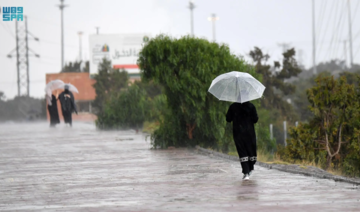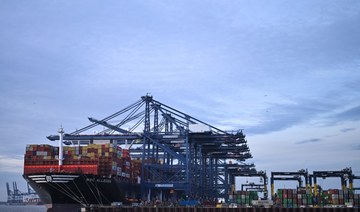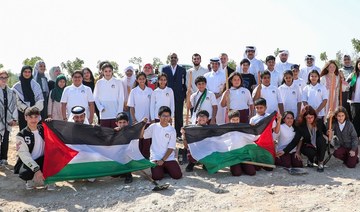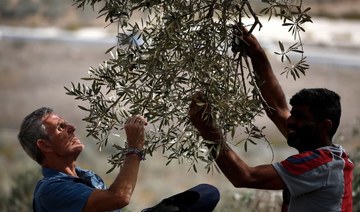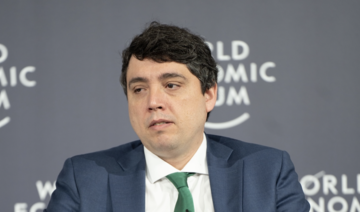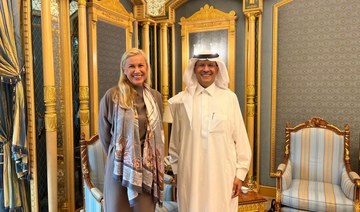TEL AVIV: With a multicolored kimono, clucking sounds and chicken-like dance moves, Israeli singer Netta Barzilai won over audiences with a hit inspired by the #MeToo movement to claim the Eurovision Song Contest.
Now as she sets off on her first European tour the pop star has told AFP in an interview that she aims to pass on a message of empowerment after overcoming her own self doubts.
Her winning song “Toy” became an anthem for others who, like her, have been bullied or made to feel like an outcast.
She has said her childhood was marked by teasing over her body and bouts of bulimia.
“We’re made to feel small in all kinds of situations. I don’t want to feel small anymore,” the 25-year-old said Saturday at her publicist’s apartment in Israel’s economic capital Tel Aviv.
“I want to empower and love, to be empowered and empower others. Because when we send out good energy, it comes back at us and makes the world a better place.”
Her upcoming tour, which begins on November 12, includes venues in Austria, Germany, Switzerland and Britain, as well as a November 17 show at the Salle Wagram in Paris.
Articulate and intense, Barzilai said she applied for a spot representing Israel in 2018’s Eurovision in Lisbon because she was failing to make ends meet as an experimental musician.
“I knew nothing about Eurovision,” she confessed.
Before the contest shook up her life, Barzilai said, she and her band would “be paid in beer and basically jam.”
“I’d get drunk, sing on the tables, eat French fries off people’s plates and sing about them,” she recounted.
“I tried to get a job in music but was too unique to stand behind someone as a backing vocal or to sing in weddings.”
Barzilai’s mother pushed her to leave Tel Aviv and return to their home in central Israeli city Hod Hasharon and her father suggested she learn agronomy and join him in the family business.
In despair, she turned to an Israeli reality singing show, the winner of which would represent the country at Eurovision.
She never expected anything would come of the local exposure beyond maybe “getting gigs.”
But she eventually made it through and took her eccentric look and show to Lisbon, where her victory earned Israel the right to hold the 2019 Eurovision, which will take place in Tel Aviv.
Basking in the “superman powers” she received after her win, Barzilai can now return to Europe as a star with a repertoire blending her Eurovision fame and avant-garde roots.
There have been calls for artists to boycott next year’s Eurovision in Tel Aviv over Israel’s occupation of Palestinian territory, but Barzilai doesn’t think a boycott will solve anything.
“Instead of boycotting we should think how we can help, how to improve the situation,” she said.
“Tell me where to sing to solve the world’s problems and I’ll go.”
Unconcerned that the calls to stay away could harm next year’s event, she added: “I think it will be very happy here and those voices are small ones.”
Israel’s Eurovision champ heads to Europe with empowerment message
Israel’s Eurovision champ heads to Europe with empowerment message
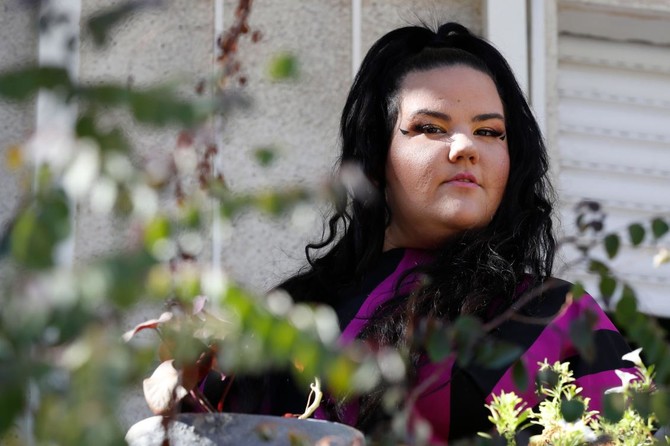
- Her winning song “Toy” became an anthem for others who, like her, have been bullied or made to feel like an outcast
- Her upcoming tour, which begins on November 12, includes venues in Austria, Germany, Switzerland and Britain, as well as a November 17 show at the Salle Wagram in Paris
Jordan welcomes UK delegation to introduce weather forecasting project
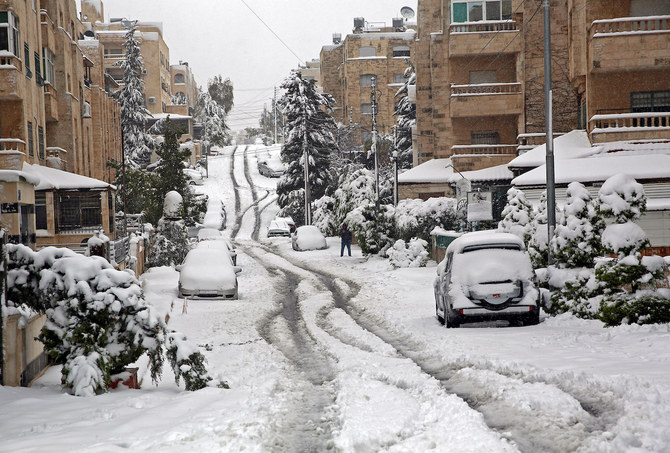
- Project aims to provide meteorological data and early warnings to refugee-hosting communities
AMMAN: Jordanian Transport Minister Wesam Altahtamouni welcomed a delegation from the British Embassy in Amman and the British Meteorological Office on Monday.
The meeting came as part of the UK Foreign Ministry’s efforts to implement the Jahez project, which aims to provide meteorological data and early warnings to refugee-hosting communities, Jordan News Agency reported.
Jahez, which will span three to five years, aims to develop proactive plans and long-term strategies, enhance monitoring and forecasting systems, and implement resilience-building measures to mitigate the effects of climate change.
The collaboration will involve Jordan’s ministries of transport, environment, planning, water and irrigation, as well as relevant municipalities.
Helen Ticehurst from the British Meteorological Office explained the British Meteorological Office’s operations and the objectives of Jahez.
The project also focuses on climate finance for countries hosting refugees.
Altahtamouni praised the British delegation for its willingness to provide technical assistance, leveraging the expertise of the British Meteorological Office in proactive weather forecasting and climate change adaptation.
Djibouti FM to stand at African Union Commission elections
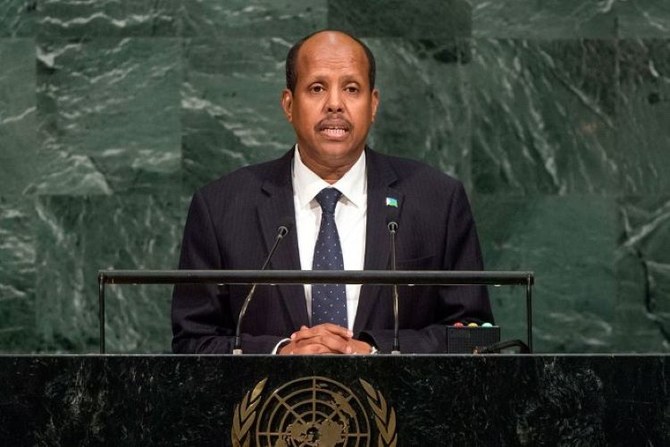
- Mahamoud Ali Youssouf calls for resolution of conflicts in Sudan, Gulf of Aden and Gaza
- Mahamoud Ali Youssouf: The only thing we know for sure today is that the next president will come from an East African country
RIYADH: Mahamoud Ali Youssouf, the minister of foreign affairs and international cooperation of the Republic of Djibouti, intends to stand for election to the African Union Commission.
The commission is based in Addis Ababa, Ethiopia. Its main functions are to represent the AU and defend its interests under the authority and mandate of the assembly and executive council.
The minister said that the main objectives of the commission are to promote integration, economic and social development, peace, security and human rights on the continent. It also aims to strengthen continental and international cooperation.
Tradition dictates that the president of the commission should be elected for a renewable four-year term, and should obviously be African, especially as the next session will be chaired by the East African Community, which includes Djibouti among its members.
The diplomat believes that winning these elections will contribute greatly to strengthening integration between the countries of the continent, as well as to reinforcing African relations with various other geographical groups, given the international and regional acceptance and respect enjoyed by Djibouti thanks to its balanced foreign policy.
Youssouf said he had been encouraged to stand as a candidate in the forthcoming elections by the respect and diplomatic appreciation that Djibouti possesses, highlighting also his long personal experience in the diplomatic field as an ambassador and then as minister of foreign affairs and international cooperation since 2005, and his in-depth knowledge of the work of the AU.
He said that a good knowledge of continental affairs is essential to occupy such an important position, adding that such an organization needs experienced leaders and diplomats to effectively promote continental and international cooperation given the continent’s current circumstances.
“The only thing we know for sure today is that the next president will come from an East African country. It will then be up to the member states to decide on the day of the vote,” he said.
Youssouf said that if elected, he will focus, in the interests of the African people, on three important areas: strengthening cooperation and economic integration between the countries of the continent; developing continental and international cooperation; and cooperation with international and regional organizations such as the UN, the Organization of Islamic Cooperation and the Arab League.
In early January, the Somaliland region signed an agreement with Ethiopia granting it a maritime opening to the Gulf of Aden. This treaty led to a political crisis between Ethiopia and neighboring Somalia, which promptly cancelled the memorandum, calling it illegal.
Youssouf said Djibouti currently chairs the Intergovernmental Authority on Development, and that Somalia and Ethiopia are members, along with other countries in the region, which gives it an additional responsibility in mediating between the two. He said that settlement efforts are continuing with Djibouti and Kenya mediating, with hopes that the two parties will reach an agreement soon.
He added that Djibouti, through its current presidency of IGAD, is very interested in seeing diplomatic relations between Somalia and Ethiopia return to what they were before the signing of the MoU.
Youssouf maintains that other crises in the world have distracted attention from Africa’s bloodiest conflict in Sudan, calling it the most forgotten crisis, especially when it comes to refugees and population displacement. He said that over 6.5 million Sudanese have been forced to leave their homes, with over a third of them displaced outside the country, and that the proliferation of ethnically-based militias in the current conflict is equally alarming.
As Sudan is a founding member of IGAD, he said Djibouti is making intense and continuous efforts in coordination with the other member states and the international community, notably the US and Saudi Arabia, to find a solution to the ongoing conflict in this brotherly country.
He also revealed that his country had already received representatives of the parties responsible for the crisis in Sudan to listen to their points of view and their vision for a solution. It should be noted that all have affirmed their desire to put an end to the war, and hope that these efforts will lead to a permanent and unconditional ceasefire, Youssouf said.
Recently, attacks on ships in the Red Sea have intensified, targeting vessels and disrupting this most important maritime passage. Youssouf said Djibouti is following these developments with great concern, specifying that the Bab Al-Mandeb Strait, overlooked by Djibouti, is considered an international passage of extreme importance from a political and economic point of view.
He confirmed that any breach of security in this area has global repercussions, given its role as a vital artery for international trade, and called for solutions to be found to the various crises in the region, so that everyone can enjoy peace and security.
With regard to the war on Gaza, Youssouf urged the international community to assume its responsibilities and put an end to the Israeli campaign which has cost the lives of over 34,000 people, as well as the resulting displacement and famine threatening the lives of millions of children.
Jordan nominates ancient Mehras olive trees for UNESCO Intangible Cultural Heritage list
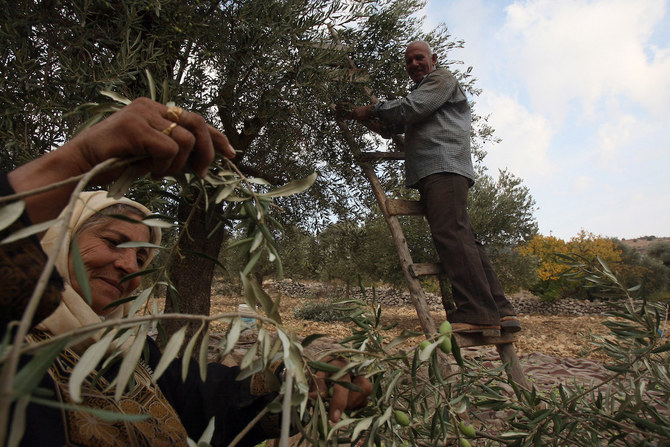
- Culture minister underscored the profound importance of the olive tree in Jordanian society
AMMAN: Jordan has nominated its Mehras olive trees for inclusion on UNESCO’s representative list of Intangible Cultural Heritage for the year 2025, Jordan News Agency reported on Monday.
According to the Food and Agricultural Organization, Jordan has some of the world’s most ancient habitats for olive trees.
Olive trees cover approximately 30 percent of all cultivated land in Jordan, constituting 75 percent of fruit trees. The olive trees hold immense significance for Jordan’s economy, environment, and culture.
Jordanian Culture Minister Haifa Najjar highlighted the importance of the tree to Jordanian heritage, drawing attention to its regional and international significance.
The minister underscored the profound importance of the olive tree in Jordanian society, representing both agricultural prowess and the cultural heritage deeply ingrained in the lives of its people.
She commended the collaborative efforts between the Ministry of Culture and national stakeholders in finalizing the nomination dossier for “The Ancient Olive Tree — Al-Mehras” to be presented to UNESCO in Paris.
Najjar noted the ministry’s commitment to documenting and safeguarding elements of intangible cultural heritage and the positive effect of such nominations on Jordan’s cultural presence globally.
The ministry previously secured UNESCO recognition for Jordanian cultural elements such as As-Samer traditional dance and mansaf, a traditional dish.
The ministry has participated in joint Arab nominations to UNESCO, highlighting the interconnectedness of cultural practices across the region. Previous submissions included files on date palm cultivation and Arabic calligraphy.
Looking ahead, Najjar mentioned joint Arab nominations currently under consideration for the 2025 UNESCO list. These encompass an array of practices and traditions, including mud architecture, traditional attire for men, musical instruments such as the oud, and various crafts and skills associated with Arab cultural heritage.
Pakistan court hands life sentences to four in 2018 murder of lawmaker
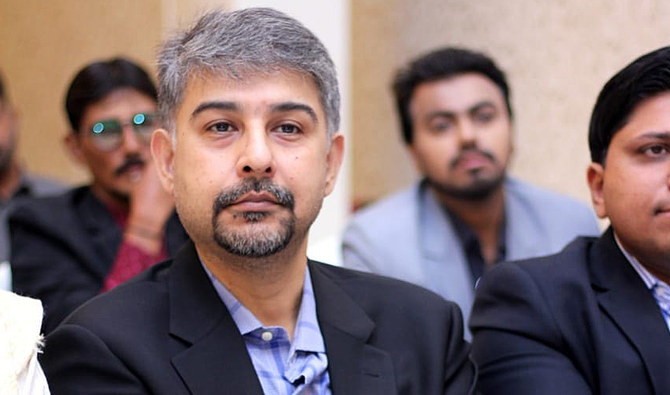
- The accused were convicted of aiding, abetting, reconnaissance, and facilitating murder of Syed Ali Raza Abidi
- Court suspends proceedings against prime accused, citing Supreme Court ruling that prohibits judgments in absentia
KARACHI: A Pakistani court on Monday handed life sentences to four accused who were convicted of aiding, abetting, reconnaissance and facilitating the murder of a Pakistani lawmaker in the southern city of Karachi in 2018.
Ali Raza Abidi, a businessman and politician, who belonged to the Muttahida Qaumi Movement-Pakistan (MQM-P) party, was shot dead outside his residence in the Defense Housing Authority (DHA) area of Karachi.
Police had registered a case against the suspects in the Gizri police station under the Anti-Terrorism Act.
“The evidence shows that all the accused persons in furtherance of their common intention are involved in the commission of murder of Syed Ali Raza Abidi and they are equally responsible for the act,” Zeeshan Akhter Khan, the Anti-Terrorism Court judge, stated in his detailed judgment.
The convicts, Muhammad Farooq, Muhammad Ghazali, Abu Bakar and Abdul Haseeb, were also fined under various sections of the Pakistan Penal Code. They can appeal the verdict within 15 days.
The court, citing a Supreme Court judgment, said since a case against absconding accused, Bilal, Hasnain, Ghulam Mustafa and Faizan, could not be proceeded in absentia, it was placed on dormant status until their arrest or appearance before the court.
Abidi was elected as a Member of the National Assembly (MNA) on the ticket of the MQM-P in the 2013 general election. He, however, quit the MQM-P following the party’s formation of an alliance with the rival Pak Sarzameen Party (PSP).
Despite briefly rejoining the MQM-P in December 2017, Abidi ultimately parted ways with the party in September 2018. He was killed months later on December 25, 2018.
Saudi chemicals giant SABIC targeting net zero by 2050, CEO says
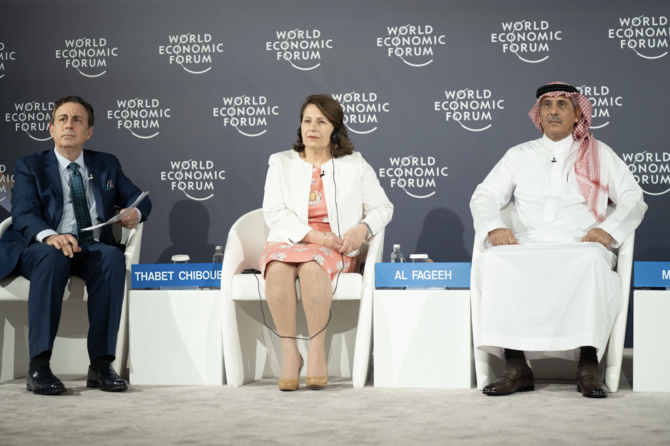
- SABIC aims to convert 1 million tons of waste into feedstock for the petrochemical industry by 2030, Al-Fageeh said
RIYADH: Saudi Arabia’s top chemicals company is turning to circular economy solutions to reach carbon neutrality by 2050 and advance the Kingdom’s net-zero agenda, its CEO has said.
Abdulrahman Al-Fageeh, CEO of the Saudi Basic Industries Corporation, was speaking at the “Demand for Energy ... Transforming Costs into Gains” panel during the special meeting of the World Economic Forum in Riyadh.
SABIC aims to convert 1 million tons of waste into feedstock for the petrochemical industry by 2030, he said.
The circular carbon economy has helped the chemicals sector expand its investment horizon since 2020, he added.
Al-Fageeh said that SABIC marked achievements in energy efficiency and reduced its carbon footprint at the end of 2023 by 12.74 percent. The company is targeting carbon neutrality by 2050.
SABIC has also adopted alternative energy from plastic waste, seeking to produce 1 million tons of sustainably sourced chemicals by 2030.
Energy efficiency
Al-Fageeh said that his company had started sustainability programs at an early stage, improved reliability, developed 90 initiatives and projects, and closed a number of sites due to ineffectiveness.
In 2023, SABIC had more than 200 patents, 40 percent of which related to sustainability in energy efficiency.





